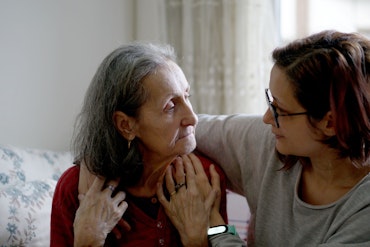Improving respite experience for people with dementia
Respite services can provide people living with dementia important opportunities for social contact and physical activity, and give carers a break from their caring role.

Two new resources aim to improve the respite experience for people with dementia (Source: Shutterstock)
But it’s often difficult to know what is available and what services can meet the specific needs of a person living with dementia.
Alzheimer’s Australia has worked together with the University of Wollongong and Carers Australia to create two new resources to improve the respite experience for people with dementia.
The free booklets, ‘Flexible Respite Services for People with Dementia and their Carers’ promote best practice strategies for respite service providers and assist people with dementia and their carers to navigate the system.
There are currently 413,1061 people living with dementia and Alzheimer’s Australia highlights that as this number continues to rise, the need for flexible and quality respite care will increase proportionately.
The new resources suggest a new approach to respite care is needed to cater for a growing and diversifying clientele and according to Alzheimer’s Australia National Chief Excecutive Officer Maree McCabe they are “essential to ensure that best practice in respite care is being delivered in the care and support of people with dementia and carers”.
“As both the aged care and disability sectors move to consumer-directed and individualised funding models, it is vital that respite services ensure they are flexible and responsive to the needs of people living with dementia, their families and carers,” Ms McCabe continues.
“It is so important that people living with dementia have access to quality respite services that provide opportunities for social contact as well as physical activity and emotional stimulation. For carers it is essential they take time to look after themselves and know how to access quality and flexible respite services to do so.”
“As the Easter period approaches, it is a good time to start a dialogue with family members about the benefits and options for respite,” she adds.
Conny and Bryan Gard of Canberra know the importance of quality, flexible respite care.
Bryan was diagnosed with Alzheimer’s disease two years ago, and attends respite programs aimed at people with younger onset dementia. He attends a day care program for five hours once a week and also attends Greening Australia and The Men’s Shed for two hours each once a week.
“Respite care gives me a chance to do something on my own that I enjoy, attend errands or just to give me a break from my carer role,” Mrs Gard explains. She says Bryan enjoys the social interaction, the company of the other people attending and the variety of activities of the respite programs he attends.
“There has only been one occasion where Bryan did not enjoy respite care and knowing how he felt makes it difficult to send him back to that particular environment. I would feel guilty about leaving him if I knew he would not enjoy his time in respite. This experience demonstrated to me how important it is for respite to be flexible to the needs of those attending,” Mrs Gard says.
Project leader of ReThink Respite, Dr Lyn Phillipson from the University of Wollongong says gaining access to flexible respite is really important – but it is often difficult for carers to know what is available and to identify services which can really meet their particular needs and those of the person with dementia.
“Resources like these will help carers access information to assist them with understanding and navigating the system. The booklet for service providers will also be useful in promoting best practice strategies to better meet the needs of people with dementia and their carers,” she says.























